
Want to learn how to hire developers for your startup?
You’re in the right place. Today, you’ll get the best strategies to find software developers for startups.
Want to learn more? Read on!
How do you hire a startup developer?
If you’re wondering how to hire developers for your startup, whether you’re hiring your first developer or you’re building a technical team, then this guide is for you.
We’ll look at all of the challenges you might face when hiring developers:
- Where to look for developers
- How to choose between outsourcing development work vs doing it in-house
- How to make sure that you choose the right developer for your startup
- And more!
First, let’s start with discussing the challenges you might face when you hire a developer for your startup.
The challenges of hiring developers for startups
The biggest hurdle for startups looking to attract top talent? Simple:
You don’t have big (hiring) muscles just yet.
While companies like Amazon can snap their fingers and get a long list of highly qualified applicants for their open positions, you’re probably not that established.
In fact, these statistics show just how hard it is to hire technical talent:
- It takes 39 months to find developers and engineers in US tech hubs
- 86% of tech leaders say they have trouble finding tech talent
- 80% of technical hiring managers think there is a lack of talent
- Demand for software developer roles grew by almost 25% in 2020 compared to the same time period in 2019
- Recruiting a new hire will typically cost 20-25% of that person’s base salary
That’s why you need to have a savvier hiring strategy. One solution is to work on your employer brand so that applicants become interested in your startup.
We’ll look more at what’s required here below, but in short, it comes down to creating a top-notch candidate experience. (Yes, you can do that even if you’re a relatively new startup!)
Plus, as a startup, you might not have a massive hiring budget. And because you’re a small team, you’re looking for developers who are both flexible and who share your vision -- after all, they are the ones who will build your product.
While you as a startup need to be flexible too (and maybe offer other types of perks and benefits, such as vacation days and remote working, instead of an industry-leading salary), it all comes down to positioning yourself in the best way and looking for developers in the right places.
Before we talk more about that, let’s look at why developers want to work for a startup. After all, if you understand their motivations, you’re a lot better positioned to offer what they want.

Why do developers want to work for startups?
Why do qualified candidates want to work for startups? They could get more secure and better-paid jobs at bigger companies, but there are several reasons why someone would choose a startup instead of a more established company.
For instance, AngelList reports that 60% of startup employees say that they are happy at their jobs. That’s 30% more than FAANG (Facebook, Amazon, Apple, Netflix, and Google) employees.
The main reasons are:
- The opportunity to develop their skills
- Opportunities to progress
- Learning from team members
- Working on challenging problems
Other reasons are:
Your mission
According to Glassdoor, four out of five people consider a company’s mission, purpose, and culture before applying. If you have a strong mission and purpose that solves big problems, you can leverage that vision to attract top talent.
Growth
The possibility to be part of a fast-growing company can be attractive to many developers. Startups are constantly evolving and employees’ job descriptions will change equally fast. For someone who doesn’t like rigid structures or feeling like a cog in a wheel, your startup might be a great option.
Team building
For many developers who want to work in leadership positions, the possibility to build a team from the ground up can be a big perk. And if you have funding and traction, they get opportunities and experience they’d never get at bigger organizations.
Building a tech stack
Your startup is new and its tech stack needs to be built from the ground up. An interesting opportunity for many developers! They get to solve big problems and choose what the tech stack looks like from day one.
Autonomy
Many startups offer a lot more autonomy than bigger companies. Your team is tight and small so you have to rely on people’s self-leadership more than organizations with a bigger employee base. Autonomy is good for employee satisfaction, too, as research shows.
Flexibility
Finally, another perk of working at a startup is flexibility. As many startups need to find ways to attract talent that a) don’t cost them a ton of money and b) can compete with bigger, more well-known employers. So, they tend to offer things like remote or hybrid work models.
55% of employees say they want to work from home at least three days a week. And 83% prefer a hybrid model. This flexibility is great for people who want to travel, are parents, and other groups of people who prefer to focus on results rather than the time they put in.
Qualities to look for in a developer
What are some of the top qualities your developer should possess?
Of course, this depends on your company and the role you’re hiring for. Make sure you are clear on your hiring criteria before you start looking for a developer.
However, some of the qualities you might want to put on that list include:
- Problem-solving skills (you’re building a startup and there WILL be challenges ahead, so if your programmer is eager to work on them, you’ll get through them a lot faster)
- Flexibility (a startup isn’t static, and your different team members might need to take on new roles; a developer who understands this may be a great fit)
- Communication skills (you’re likely a small but agile team, and to make teamwork easy, you need a developer who can communicate and preferably explain technical solutions to non-technical stakeholders)
Your developer should also have technical skills, such as:
- Experience in the language/framework you’re hiring for
- Ability to write clean and maintainable code (to collaborate successfully with colleagues)
- Understanding of source control (to track file versions and the source code)
- Database maintenance skills (to secure, backup, and manage databases)
- Understanding of algorithms (to solve problems faster)
- Understanding of system design
- Cloud computing skills (developers who understand cloud services can help you create a great cloud computing strategy)
- Data privacy and security skills (an increasingly important skill, especially if your startup deals with data)
- IDE skills (developers need to master their Integrated Development Environment to be able to write, compile, run, and debug their code)
Now you know what type of developer you’re looking for. But should you go for one who works as part of your in-house team or outsource your development needs?
Here’s what you need to know.
Should you outsource or hire in-house?
Which is better: to hire an in-house developer or to outsource your development to an agency or a freelancer?
This depends on your goals and project.
Do you have occasional development needs? Do you need someone part-time? Or full-time?
If you require someone full-time, an in-house developer might be the way to go.
But if you only need occasional or part-time help, then outsourcing is likely your best option.
There are pros and cons to both:
The main benefit of outsourcing your tech needs are flexibility and cost. You can get help on a flexible basis, depending on your needs. And typically, that’s more cost-effective than employing full-time developers. Plus, you can more easily scale down your efforts if your revenue decreases for whatever reason.
But while employment involves a lot of admin and is typically more expensive, that’s probably the best option if you’re hiring a full-time team member. And this is the benefit of full-time hires: you’re building a team of developers whose primary focus is your company.
Having said that, if you do decide to outsource, you need to decide if you’re outsourcing to an agency or a freelancer/consultant.
An agency doesn’t (necessarily) need as much oversight as a freelancer. But a freelancer can become more involved in the team. This is especially important if you decide to first outsource and later hire someone full-time; a long-term freelancer might be interested in joining your team.
When should you hire your first developer?
Finally, when should you hire your first developer? After all, hire too soon and your budget might not stretch that much, or hire too late and you could lag behind on product development. Here’s how to know about when to hire:
Minimum Viable Product (MVP)
The rule of thumb is: get past the MVP stage. If you’re a non-technical founder, look at no-code solutions that can help you get started faster without having to take on a developer. A few tools include:
Adalo: Apps
Appy Pie: Apps
Shopify: Ecommerce
WordPress: Blogs/websites
Clickfunnels: Sales funnels
Carrd: Simple landing pages
Webflow: Custom designs
Either way, the MVP stage should be extremely lean. If you end up taking on a developer, don’t do a ton of development work upfront. Get your product out there and develop it as-needed. At this stage, a freelancer, an agency, or a part-time developer is likely the best way to go.
Scaleup
If you’ve already validated your idea, you have traction, and maybe gone through a seed round or series A… Then it’s time to start developing your product, whether that means hiring a CTO and a team of devs or your first few developers. That’s what we’ll look at below.
How do you find a programmer for a startup?
To attract the best talent, you can’t just wait around for it to find you. Instead, be active, search for the right candidates, and spread the word about your job opportunities.
How do you find a developer for your startup?
What does it take to find a developer for your project?
You need to be active. Here’s what I mean:
Search websites
Below, I’ll list websites you can use in your search. These are websites where you can either search for developers or post a job and search through applications.
You can search for developers based on your criteria and reach out to them. A great way to fill your candidate funnel!
Here’s a template message to modify according to your needs:
“Hi [name], I happened to come across your GitHub profile and I’m impressed by your open-source projects. Great work! We are looking for a (position) to help us (your mission). Would you be interested in talking more about it? I’m happy to send over some more information. Thanks!”
Get referrals
Another strategy is to ask for referrals, especially from your employees. According to Jobvite, employee referrals are the second-best source for quality hires. And according to a report by employee referral app Erin, 82% of employers say that employee referrals generate the best ROI.
Of course, that doesn’t rule out asking your broader network. It could be as easy as posting a LinkedIn update.
Pro tip: According to a Pinterest study, companies get 55% more referrals for underrepresented candidates when they subtly prompt their engineers to refer such candidates.
Think outside the box
Don’t just use the “normal” avenues for finding candidates. Think differently: what are some untapped resources for finding developers?
For instance, all-women’s coding camps and programs that focus on training black, Latinx, and other underrepresented groups are a few of the resources you can tap into.
Post a job
Job posts are still an effective way to get quality candidates. According to Jobvite’s report, it’s the third top hiring source for finding quality hires.
However, you do need to use the right type of job post. Here’s a template you can use:
[Title: Clearly and transparently describe what the job is all about]
We are looking for a Software Developer to... You will be responsible for… You will also...
Software developer responsibilities
[List the responsibilities. Hit the high points; focus on the most important things the developer will be doing day-to-day.]
- Responsibility 1
- Responsibility 2
- Responsibility 3
Skills and qualifications
- Include skill and qualification requirements, such as the language a developer should be proficient in and other languages/frameworks/technical skills they need depending on your existing tech stack.
- List the required educational level and certifications; if it's flexible, you can mention that it’s “nice to have” or leave these out altogether.
Be active on social media
Actively share your open positions on social media, show your work culture, and talk about the benefits you offer. The platform worth focusing on is likely LinkedIn or Reddit, as those are where most candidates hang out.
But the social media platform of your choice also depends on your target audience. If you’re reaching out to junior developers, TikTok or Instagram can be good options, too.

Become an attractive employer
Finally, you have to position your company so that it stands out on the market. If you have a strong employer brand, you’ll likely attract better talent.
Look at other companies in your industry. What do they offer? Can you offer the same?
For instance, one of the best ways to attract more talent is to offer remote positions. A majority of workers want to work remotely at least part of the time.
And it’s not like it’s bad for business. Workers’ productivity goes up 13% when they work remotely. PwC reports that 83% of employers have found remote work to be successful. What’s more, if you open up for remote talent, you can reach a much bigger pool of developers than your local talent pool.
The best websites to hire startup developers
There are a number of websites you can use to reach out to candidates. Here are the top websites to find developers:
1. LinkedIn
LinkedIn is the biggest professional social media platform out there, so it makes sense to use it in your search. You can either use the search function to find candidates who you reach out to or post a job on the platform.

2. Upwork
Upwork is the biggest online community for freelancers. Naturally, a big chunk of its users are developers. You can search for candidates with your criteria and reach out directly to them, or post a job and choose between people who apply to it.
On Upwork, rates vary significantly. But so does the quality, so make sure you have a good assessment process in place.
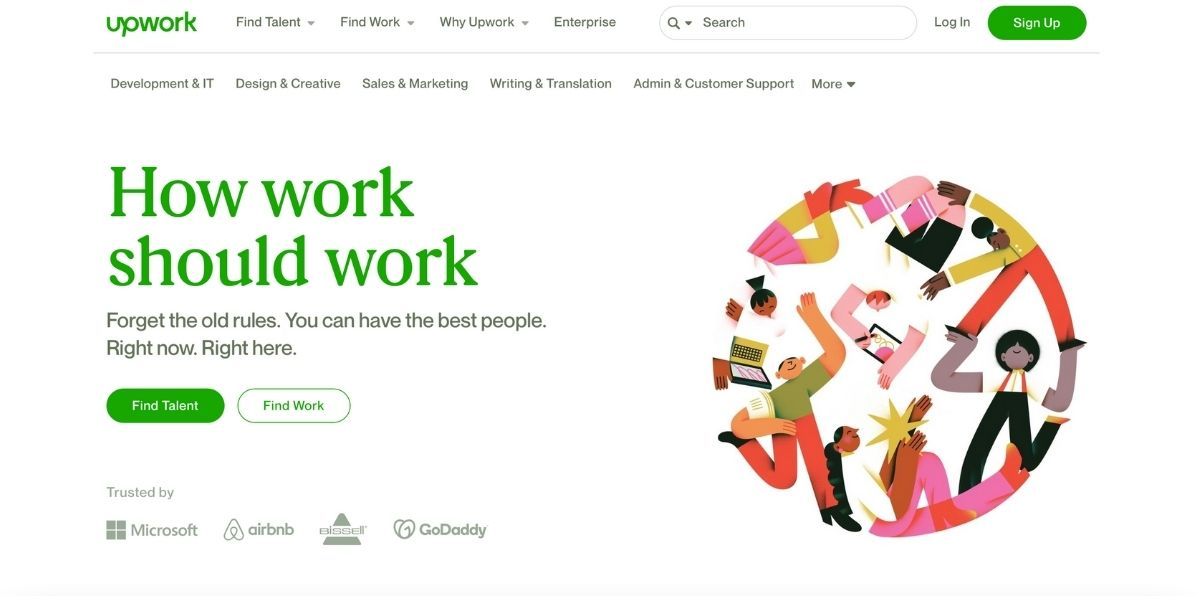
3. Toptal
Toptal is a freelance platform for developers. What makes it different from platforms like Upwork is that it vets developers beforehand, so you can be pretty sure that the quality is top-notch.
The difference is also that you need to hire developers for bigger projects (at least on a part-time basis). Toptal finds the developers for you (and refunds you if you’re not happy with their choice).
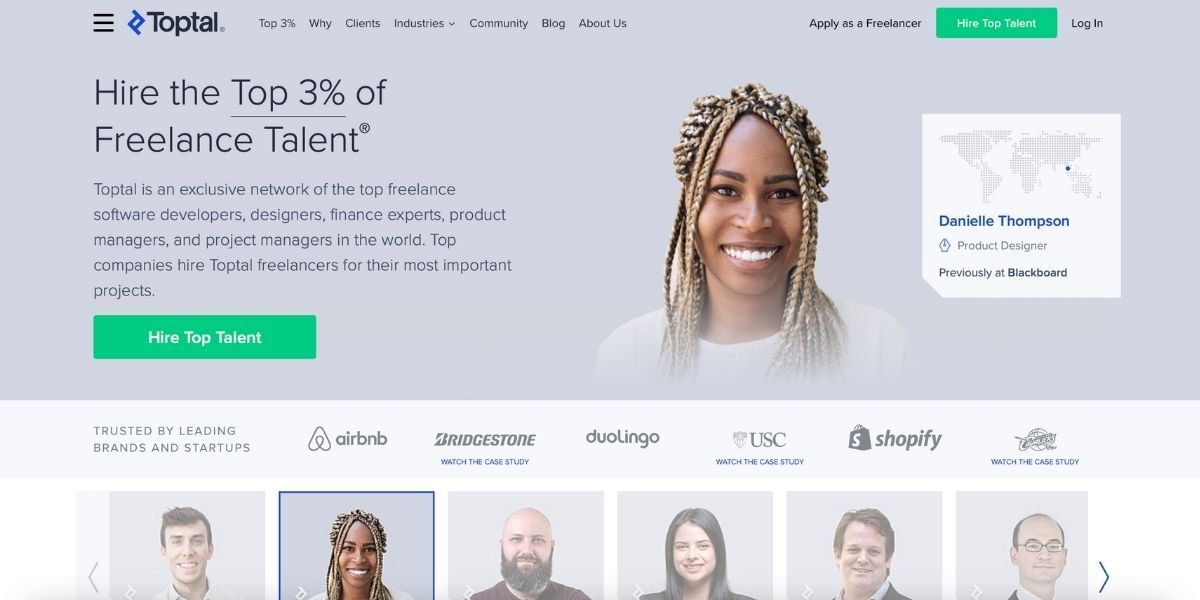
4. Github
Github is a great resource for finding good candidates. You can search GitHub and get a good understanding of how established the developer is. For instance, the number of followers indicates how active they are in the open-source community (with 75+ followers being excellent and 21-75 being very good; 2-20 followers is good but is likely to be a newer developer). You can then check their LinkedIn profile for more information and reach out.
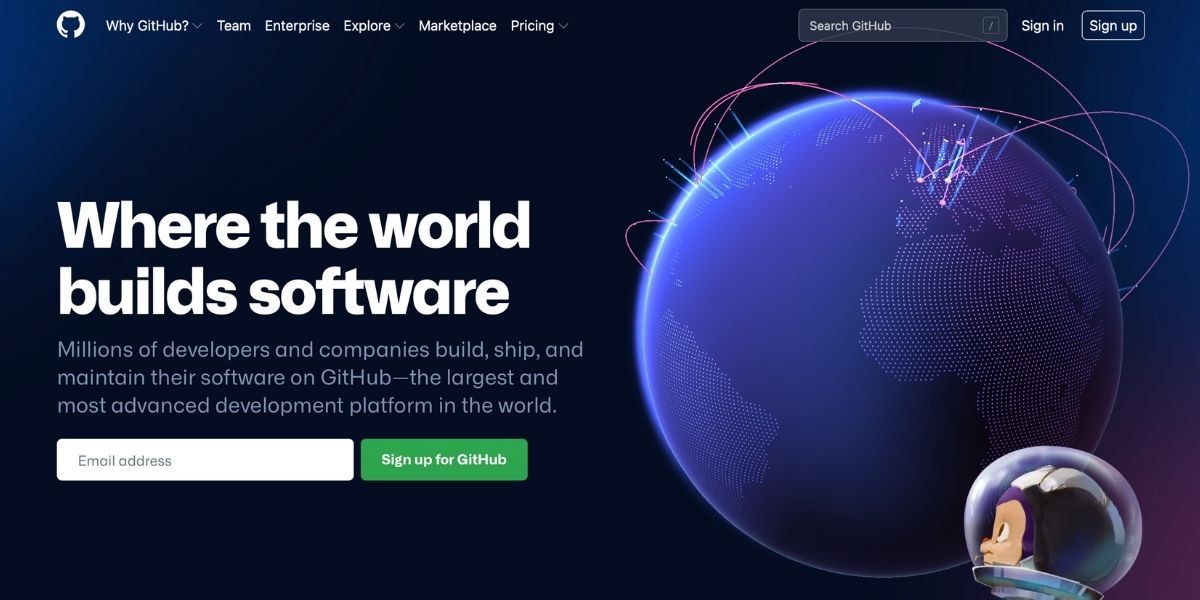
5. AngelList
AngelList is a platform for startups and is a great resource for hiring developers. Use the recruit page to post a job on the site.
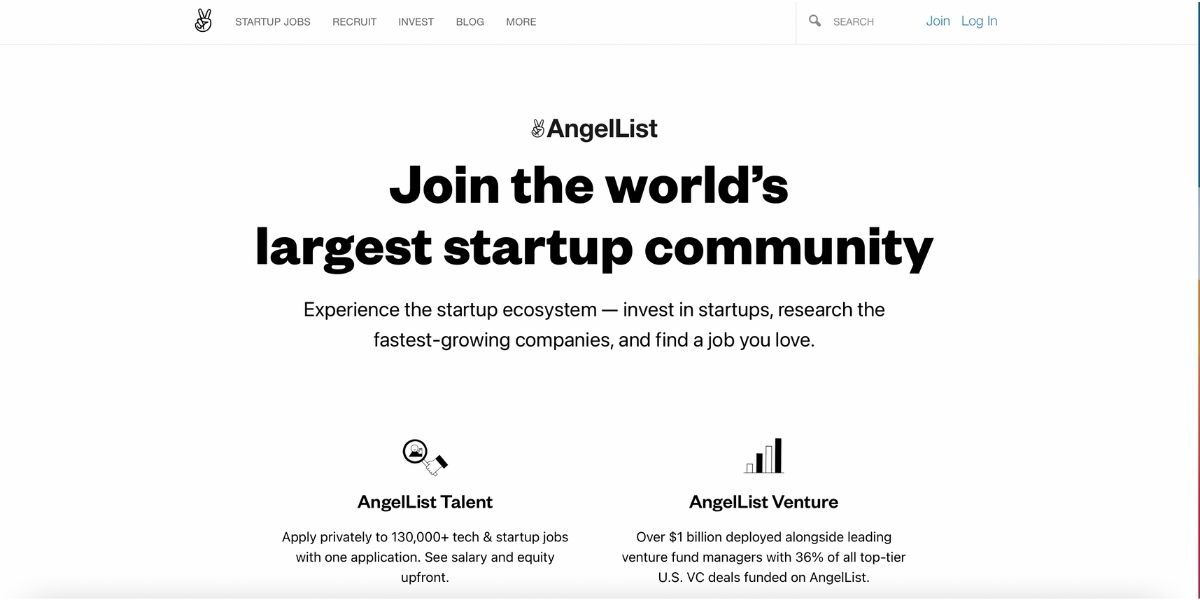
6. Guru
Guru is, like Upwork, a general freelance platform. And similarly to Upwork, the quality and pricing range a lot, so be careful to vet your developers well before making a hiring decision.
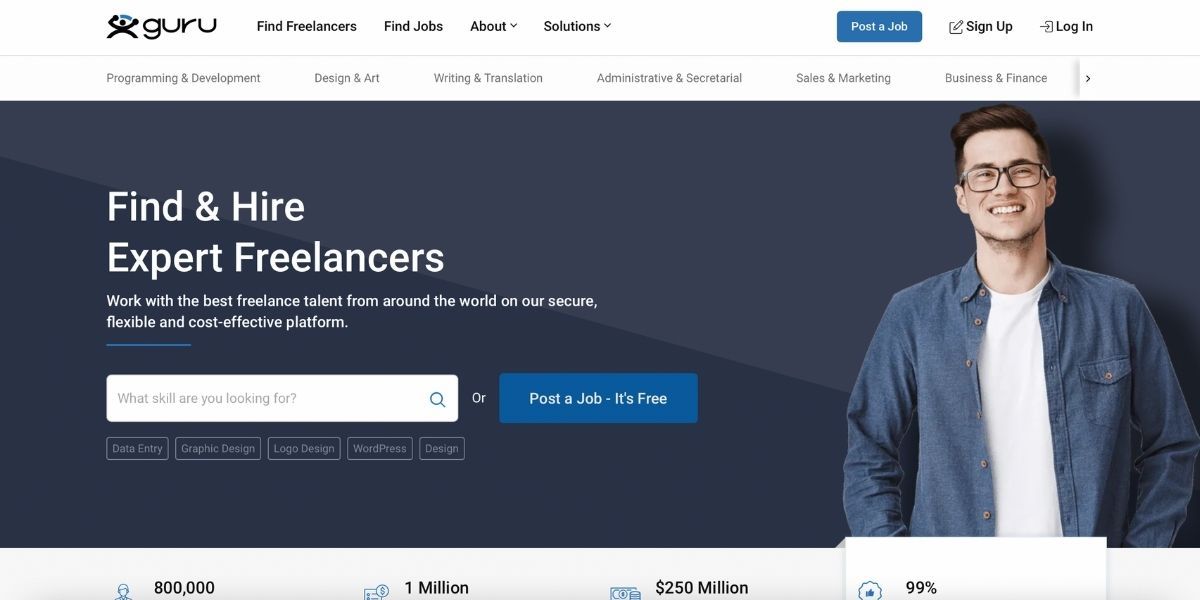
7. Gun.io
Gun.io is a platform dedicated to helping entrepreneurs hire developers on a full-time and freelance basis. Gun.io vets, similarly to TopTal, their talent before allowing them on the platform. The minimum project scope is 10 hours a week and for a full-time developer, Gun.io charges a sum that equals 15% of the developer’s annual salary.
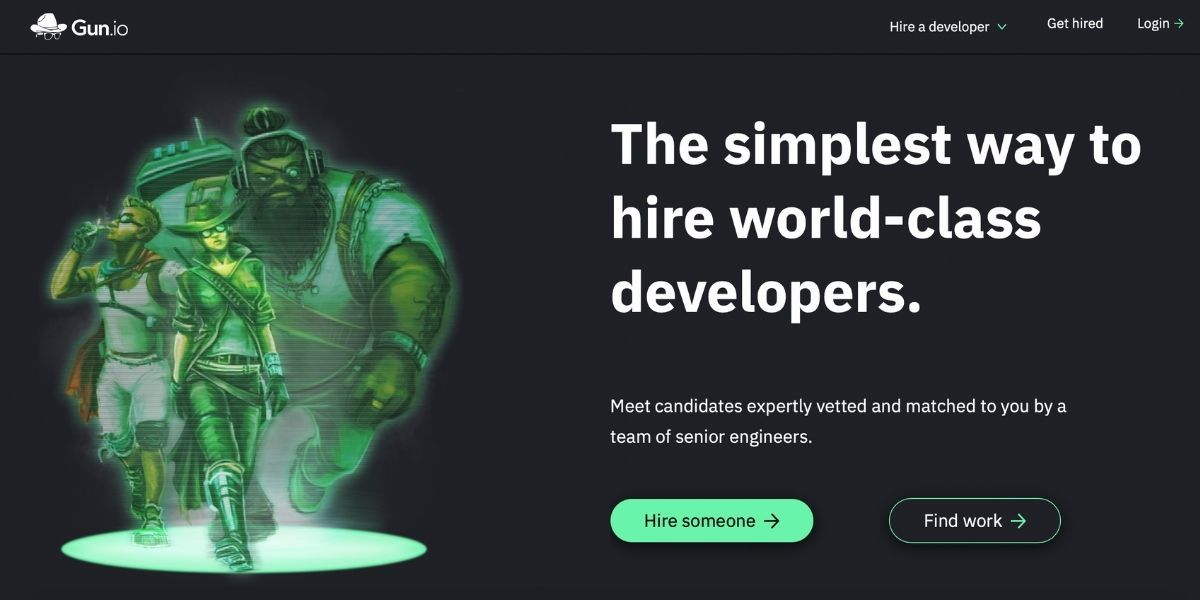
8. Dice
Dice is a leading platform for tech talent. You can either post a job or comb through candidate profiles.

9. Topcoder
Topcoder is a crowdsourcing platform for developers and designers. You can post your project on the site and receive solutions on how to execute it. The talent you find on this platform is suitable for both short-term and long-term projects.
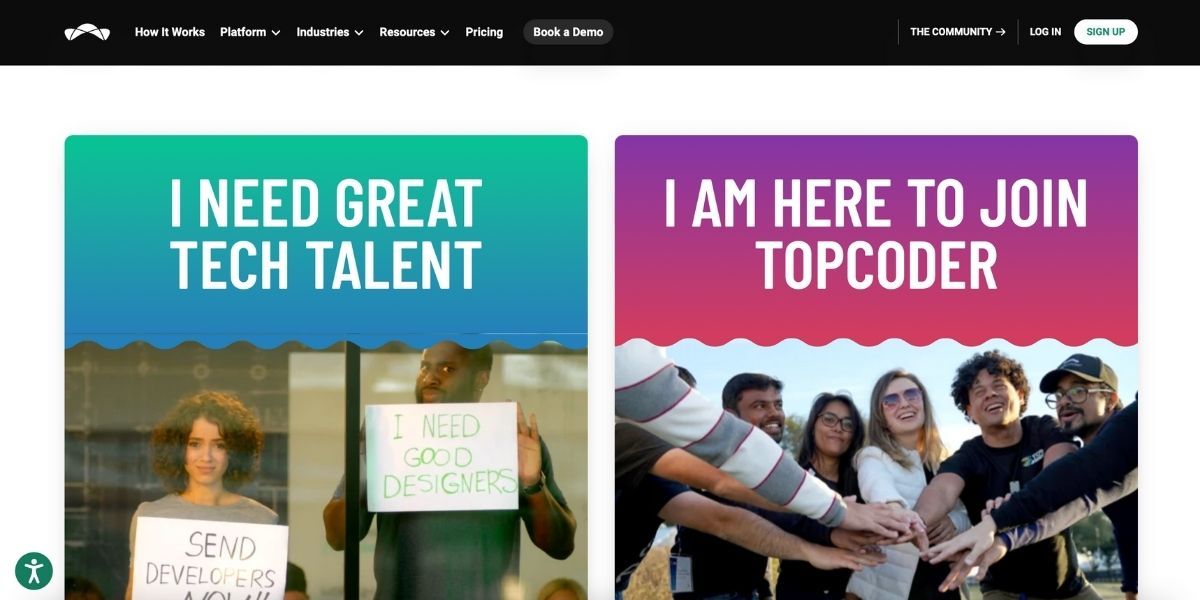
Now you know where to find developers. But how do you find them? Here’s what you need to know.
What steps should you take to hire a developer?
Hiring a developer comes down to practice and processes. It takes practice to spot the right developer, but you can make it a lot easier by implementing processes and systems. And with a consistent and smooth hiring process, candidates get a more positive view of your company and you’ll likely attract quality applicants the next time you look for a developer.
Here are the steps to take to hire your next developer for your startup:
Set up a hiring team
First, put together a hiring team. If you’re a small team, involve the entire team. If your team is on the bigger side, you might involve your CTO, hiring manager, and another technical team member.
There are good reasons to put together a hiring team. With a team, you get accountability. We all have biases and in hiring processes, we often revert back to them without even noticing.
So to ensure an objective hiring process that selects the RIGHT candidate (rather than the one who has the same skin color, gender, or socioeconomic status as other team members), ask your entire hiring team to review resumes and interviews.
Define your hiring criteria
One of the most important parts of your hiring process is to have clear selection criteria. In other words, standards against which you measure all candidates.
You see, without objective assessment guidelines, it’s hard to be, well, objective.
Look at abilities, knowledge, and skills that you require as part of the job description and define the standard for successful performance of those functions.
For instance:
Abilities, knowledge, skill: JavaScript (junior developer)
Selection criteria: Basic JavaScript syntax, including HTML and CSS. Understands the difference between ES6 and ES5. Basic HTML and DOM API knowledge. AJAX API knowledge.
Candidate selection
Once you have a few applicants sourced (you’ve searched for them on job boards, on websites, and used the other strategies we’ve laid out in this article), it’s time to select your candidates.
At this point, you can filter out the first candidates who don’t meet your hiring criteria. Move the rest of them to your first round of phone interviews.
Interviews
The next step? Interviews. You’ll likely have at least a few rounds of interviews.
We recommend approximately three rounds (depending on the size of your startup).
First, a phone interview. This should be a relatively quick call (around 15 minutes) to get a sense of who the candidates are.
Then, you might ask candidates to take your assessment (more on that in the next section), before candidates meet with either a) the CTO/founder/another stakeholder and b) with the team.
Skill assessment test
In between your interviews, set up a developer assessment test. This is a technical skill test that objectively shows the level of a candidate’s skills.
There are various types of coding tests:
- Take-home coding challenges: Candidates complete coding tests remotely at their own pace. The tests are relatively small, but big enough so that they help you get a good understanding of someone’s skill level (they should take around 3-4 hours to complete). Take-home coding challenges are then assessed and your hiring team gives feedback to all candidates (an important step for your candidate experience!). Take-homes are often the most objective coding test because candidates solve a real-world challenge as they would if they were part of your team.
- Pair programming: In pair programming interviews, a member of your hiring team and a candidate sit down to solve a coding task. The idea is that they discuss the challenge and solve it together. That way, your hiring team gets a good understanding of the candidate’s thinking, problem-solving skills, communication skills, and ability to work in a team.
- Screening tests: while screening tests are popular in the industry, you as a small startup shouldn’t need to use them. They’re a good alternative for employers who need to weed out a lot of candidates early on (think Amazon, Netflix, and so on). But they aren’t the best option for startups with a limited number of applicants.
Extend an offer
The last step is to extend an offer.
First, make a verbal offer or, if you prefer, an offer letter.
Don’t forget to keep the other candidates in the loop of your decision-making. Once your chosen candidate has accepted, promptly let them know.
Over to you!
There you have it! Now you know how to hire developers for your startup.
What it comes down to is that you are intentional about creating an exceptional candidate experience, actively look for the right candidates, and test their skills before you make a hiring decision.
Want to get started right away?